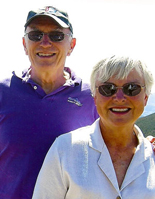January 23, 2012
William Richter caps a lifetime of service to K-State with planned gift

William Richter came to K-State in 1966, fresh off of brief teaching engagements at the University of Hawaii and the Illinois Institute of Technology. What he may not have known at the time is that he’d stay at K-State for 42 years, create several new courses in political science, chair the Landon Lecture series, and serve as the political science department head, director of the K-State South Asia Center and founding director of the office of international programs.
In fact, before he ever came to K-State, he was unsure of a future in higher education at all. It was just prior to his senior year at Willamette University in Salem, Ore., when one of his professors suggested that he apply for a Danforth Fellowship, which was designed to support graduate study for individuals planning careers in college or university education. At the time his intention was to enter the U.S. Foreign Service — but he was awarded the fellowship, and his life’s path was forever changed.
Richter graduated from Willamette in 1961, earned his master’s from the University of Chicago in 1963 and his doctorate from the same institution in 1968. From 1969-1970 he served as a Fulbright Lecturer at Panjab University in Chandigarh, India. And throughout four decades at K-State, he taught dozens of courses in political science, helped create the international studies program, women’s studies program, the community service program and other interdisciplinary endeavors. He retired in 2008.
Richter, who lives in Manhattan with his wife Linda — also a retired K-State professor — found his experience at K-State to be so influential on their lives that they’ve included the university in their estate plans, ensuring that many of the programs he helped build will continue. Recently, Richter shared reflections about his various interests on campus and his motivation for giving to K-State.
Can you talk about some of the programs you’ve supported at K-State@f0
I was privileged to be involved both in the strategic planning that led to the office of international programs and in the implementation of those strategic planning recommendations. I am firmly convinced that international experience transforms students’ lives and that international students and faculty greatly enrich our campus culture.
My wife’s parents and my mother all died from cancer — and my wife and I are both cancer survivors. We have a great amount of respect for the late Terry Johnson, who created the Center for Basic Cancer Research, and for Rob Dennell, the present director. The scholarships we established there were intended to open up new areas of cancer center involvement.
Political science was our departmental home for more than 40 years. My wife coordinated political internships for many years, and the Beyond the Campus scholarship combined our interests in international and other off-campus learning opportunities. We have provided for a similar scholarship at our alma mater, Willamette University.
Why did you ultimately choose to include K-State in your estate plans@f1
As I looked at planned giving, I wanted to provide support for causes to which I have already been giving, or to which my wife has contributed. I anticipate that the immediate impact will be relatively small, but I have structured my planned giving to grow over time, so that ultimately each annual increment could be significant.
How did K-State have an influence on your personal and professional life@f2
K-State is an exceptionally friendly, supportive and interdisciplinary place — it has been very good to us. It has given both of us the freedom and encouragement to excel, to work and travel abroad, and to engage in administrative roles that enriched the university and built strengths for the future. We didn’t plan to stay here long, but are very glad we did.
